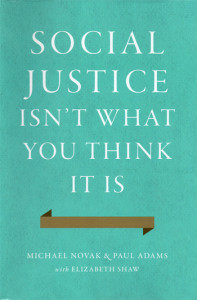FROM THE ARCHIVE: Review of Writing from Left to Right
Published by Brian C. Anderson in The Washington Times on December 4, 2013

Catholic theologian, social thinker, diplomat, political speechwriter, journalist, influencer of prime ministers and popes, author of dozens of important books — Michael Novak has lived an extraordinary public life. "Writing from Left to Right" is his entertaining and wise memoir of that engagement with his age, and of his movement across the political spectrum.
Born in 1933 to a working-class Slovak family in Johnstown, Pa., Mr. Novak describes two stories from his childhood that colored his later politics. The first is of listening with his father to a crackling radio broadcast in 1939, announcing Nazi Germany's invasion of Poland. "Study all you can about the Nazis and the communists," his father advised. "These will be the two movements that will shape the next forty years." The second is of his Uncles Johnnie and Emil. Both worked at Bethlehem Steel and both offered a supply of gruff common sense. The adult Mr. Novak's anti-totalitarianism and distrust of out-of-touch elites found a source in these early experiences.
"Writing from Left to Right" briefly chronicles Mr. Novak's dozen years as a seminarian and his initial efforts, after leaving religious life, to become a writer, including publishing a first novel, "The Tiber Was Silver," which sold 30,000 copies.
Another chapter tells of his graduate-student days at Harvard University, where a moving encounter with the Catholic existentialist Gabriel Marcel gave him a lifelong interest in the human "person," a being "able to reflect on her own past, approve of some parts of it, disapprove of others, and choose among various roads into the future." The Protestant thinker Reinhold Niebuhr, relentlessly warning about the unintended consequences of human action, became a second enduring influence from this period.
The memoir really takes off when Mr. Novak enters the political arena. He wrote speeches for Democratic stars Eugene McCarthy, Sargent Shriver, George McGovern and Bobby Kennedy, all of whom come off as decent and impressive men. A Stanford professor at the time, Mr. Novak received an invitation from Kennedy, then seeking the Democratic presidential nomination, to fly to Los Angeles to be with him as the California primary returns came in — the very night the candidate was fatally shot.
Five years earlier, Mr. Novak had been in Rome, covering the unfolding of Vatican II, when John F. Kennedy was assassinated. That night, he and his wife Karen would dine with JFK friend John Cogley and "The Other America" author Michael Harrington, trying to make sense of the horror.
As these names attest, the Michael Novak of the '60s was on the left. Several things began to push him right. One was religious. Mr. Novak sympathized with Vatican II's progressives, who wanted to renew the Catholic faith, which they felt had become too defensive and closed to new insights into the truth. Mr. Novak's early book "The Open Church" embodied this vision.
Mr. Novak grew troubled as Vatican II began to be interpreted as calling for a complete transformation of the faith, along the lines laid down by secular elites. Such an agenda was distant from the "probing" traditionalism of Vatican II's leading progressives, future popes Karol Wojtyla and Joseph Ratzinger, Mr. Novak believed, and, in his view, calamitously misguided.
By the early 1970s, those secular elites were rubbing Mr. Novak the wrong way in other ways, too, he recounts. "I had begun to notice the appearance of two lefts — one that included my whole family and what it represented, and the other a 'new' left, based on a suddenly emerging 'constituency of conscience,' no longer rooted among people who worked with their hands and backs."
Wealthy, self-satisfied, partisans of a new, more "sensitive" and relativistic morality, the new leftists looked down on Mr. Novak's "unmeltable ethnics" — the working-class, predominantly Catholic, and culturally conservative Americans of Eastern and Southern European descent who'd eventually become the Reagan Democrats. Mr. Novak rejected the new liberalism's cultural and political views, though he still considered himself a man of the left.
Mr. Novak's rightward drift was complete after he immersed himself in the study of political economy and came out a partisan of the free economy — albeit an economy molded by a morally serious culture and robust democratic political institutions. Joining a right-of-center think tank, the American Enterprise Institute, in 1978, where he would remain until his recent retirement (and where I worked for him for several years during the 1990s), Mr. Novak read and read Adam Smith, Friedrich Hayek, Max Weber, Alexis de Tocqueville and a vast literature of other social thinkers.
The research culminated in one of his most audacious books, 1982's "The Spirit of Democratic Capitalism," a powerful defense of democratic capitalist societies based on the very real goods they provided, including the rule of law, respect for the person and widespread prosperity. Margaret Thatcher and Poland's Solidarity leaders, among many others, would draw inspiration from it.
"Writing from Left to Right" covers lots more: Mr. Novak's conflicted views on the Vietnam War; his late-'60s run-in with left-wing campus lunacy at the experimental college of the State University of New York at Old Westbury; his stints as Ronald Reagan's ambassador to the U.N. Commission on Human Rights; his tireless efforts during the 1980s and 1990s to build a consensus for welfare reform and to find new approaches to help the poor; and his profound respect for Pope John Paul II, whose encyclical on the free society, "Centesimus Annus," he clearly influenced.
Throughout, Mr. Novak's tone is conciliatory. He draws warm portraits of allies, but he's also magnanimous toward political opponents. This marvelous political memoir deserves the widest possible readership.
Brian C. Anderson is editor of the Manhattan Institute's City Journal and author of "Democratic Capitalism and its Discontents" (Intercollegiate Studies Institute, 2007) and "South Park Conservatives" (Regnery, 2005).
Copyright © 2016 The Washington Times, LLC.


